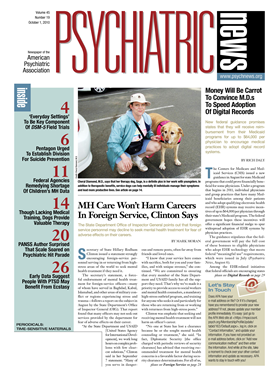For example, when Cheryl Diamond, M.D., an Ashland, Ore., psychiatrist, works at the Southern Oregon Child Study and Treatment Center, she takes her dog along to use as a therapy dog. The youngsters talk with her much more readily when she has the dog, and the dog calms them “when they are in a meltdown,” she told Psychiatric News.
Dagmar Hoheneck, M.D., a child psychiatrist at the Sonoma (Calif.) Developmental Center, a state facility for developmentally disabled people, uses her dog, Tosca, as a therapy dog with a number of patients. For instance, one of her patients not only is developmentally disabled, but also suffers from posttraumatic stress disorder due to several tragedies in her life.
“In the beginning, she wouldn't give me the time of day,” Hoheneck said in an interview. “When she was frustrated, she would head-bang, or if someone else frustrated her, she would bite the person. The only reason she started going out on walks with me was because she wanted to take Tosca for a walk. If I showed up without Tosca, she would tell me to get lost. But because of Tosca—I don't know how long it took, probably close to a year—she finally made a connection to me. Now she will go with me even without Tosca, but the dog was clearly my ticket to a connection.”
Hoheneck also had a young male patient “who could understand me fine, but who couldn't talk. He also had bipolar disorder. When he was manic, he would barricade himself in his room. But if I opened his door and sent Tosca in there, he would take her leash and would be fine as long as she was there.”
Hoheneck also has patients with profound mental retardation, some of whom are wheelchair bound. If they show any interest in Tosca, the dog will go up to them and put her head in their lap. “Some of them have smiled and spoken their first words when they had contact with Tosca,” Hoheneck said.
Hoheneck has several explanations for why Tosca seems to help these patients. “I think the main ingredient is that she is nonjudgmental. She accepts people the way they are. Some patients also know her background—that I rescued her from a family that had abused her—and I think they can identify with her for that reason. One fellow said, ‘I know what that feels like! That happened to me.’ And the other thing is, when people have been in institutions for most or all of their lives, somebody has always told them what to do. When I hand them Tosca's leash and say, ‘You're the boss now,’ it makes them feel wonderful.”


